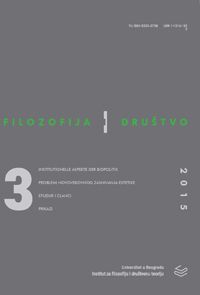(Po)ništenje vremena: o dva načina ekstemporalizacije kod Kanta i Hegela
Cancellation of Time: On Two Modes of Extemporalization in Kant and Hegel
Author(s): Saša HrnjezSubject(s): Philosophy
Published by: Institut za filozofiju i društvenu teoriju
Keywords: Time; history; extemporalization; sublime; event; conceptual history; spirit
Summary/Abstract: This article examines two modes of the canceling of time in a comparative analysis that ought to show the passage from the aesthetic overcoming of the form of time in Kant to the historical overcoming of natural time in Hegel. The essay begins with a problematization of the form of time in Kant's first Critique and with thequestion whether Kantdisplaces timeoutside the framework of mere condition of receptivity. Thereafter we will analyze the key passage from Analytics of the Sublime where Kantwrites about thecancellation of time-condition and we will interpret this in the light of an ontology of the eventualityand in the historico-political contextof French revolution. Although Kant still does not think time as historical time, the cancellation of time-condition in the experience of the sublime shall be considered as the act of the structuring of time that is emancipated from natural linearity and causal continuity. The thinking of historical time will take place only with Hegel, i.e. with his identification of timeand concept. In this sensewewill analyze Hegel's notion of "conceptual history" in order to draw a conclusion that in Phenomenology of Spirit is also at work a modus of annihilation of the natural, linear time, but unlike Kant it is truly articulated as historical occurrence. Time is constituted only as annihilated, since it is the intuitive, sensible, natural and external meaning of timewhat issublated, whiletime in itsoriginarydimension is produced only as history-time.
Journal: Filozofija i društvo
- Issue Year: 26/2015
- Issue No: 3
- Page Range: 730-752
- Page Count: 23

